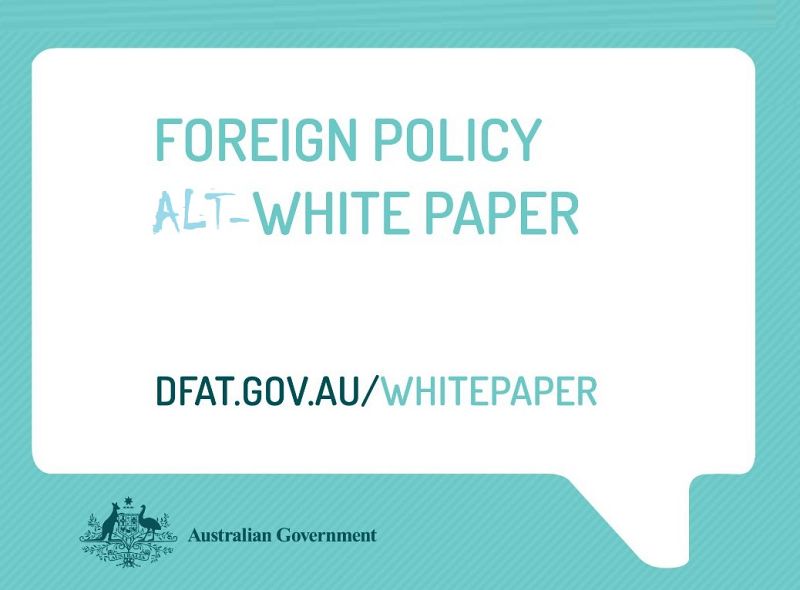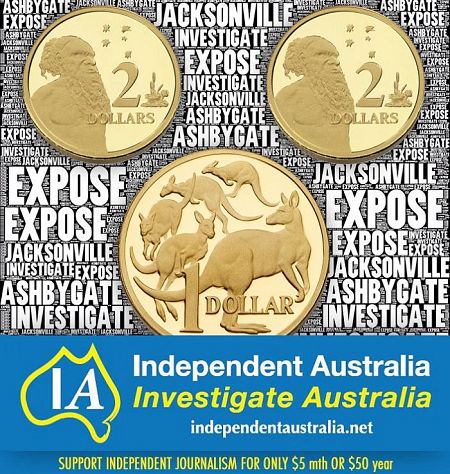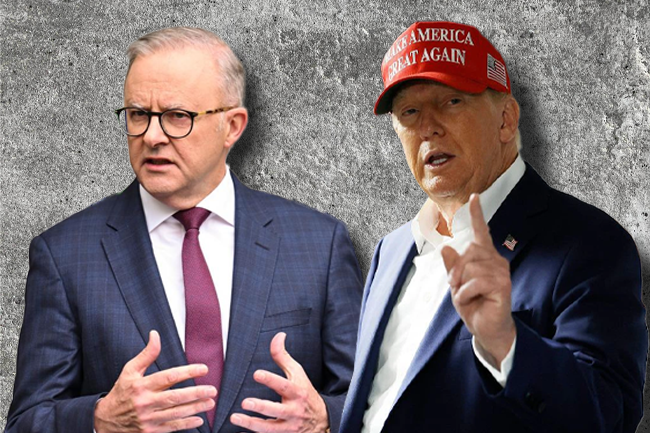A new Department of Foreign Affairs and Trade white paper is due to be released next month. Dr Alison Broinowski sets out what Minister Julie Bishop should – but almost certainly won't – say in this document.
Dear Prime Minister,
Last year, I promised Australia a Foreign Affairs and Trade White Paper – the first in 13 years – which would provide a philosophical framework for Australian policy in the coming decade.
It has taken longer than I anticipated to complete because we live in particularly interesting times. For this I do not hold the Chinese curse responsible, although not blaming China may come as a surprise to some. They may also wonder why the White Paper has no executive summary, why none of it is classified and where its recommendations are.
It breaks new ground in these ways, because after careful thought I have decided that the Australian people who pay for our Foreign Service and for the Australian Defence Force should be told concisely and truthfully what we plan to do with their money, why and with what results. So this is an Alt-White Paper.
It makes eight brief points, each with comments from leading thinkers to assist your consideration before it is released.
1. Change
In the Department of Foreign Affairs and Trade (DFAT), every decade is said to be a period of unprecedented change. This time it really is.
So much had changed by November 2016, we had to shred the first draft of this paper. Few of us in our worst nightmares foresaw the U.S. election result, or planned for it, apart from those who rushed to Obama to get the deal done on the Manus and Nauru residents. President Trump puts us in unknown territory. We still have no idea what he will do next. Nor do our State Department colleagues.
Comment: 'When the facts change, I change my mind. What do you do, sir?' (JM Keynes).
2. Alliance
The ANZUS Treaty is a central document in Australian foreign policy. It commits Australia and the U.S. merely to consult if one is threatened, and to act in accordance with another basic document, the Charter of the United Nations, which places specific limitations on countries going to war. A third important document, the ASEAN Treaty of Amity and Cooperation, which Australia and the U.S. have signed, does the same.
But the U.S. Alliance is different. It is based on a pious Australian hope, and it has been increasingly represented over the years as ignoring legal restraints. We and our predecessors have led the electorate to believe the Alliance guarantees American defence of Australia in exchange for Australia’s unquestioning support in U.S. wars. It does not. Moreover I remind you that despite repeated attempts, we have not won a war with America since 1945.
Comment: 'Doing something over and over again and expecting different results is a sign of insanity.' (Often misattributed to Albert Einstein).
3. Defence
President Trump and U.S. Ambassador Harry Harris will demand Australia pay our "share" for defence, rising to 2 per cent of our GDP, to buy more American equipment to fight more of America’s enemies.
For this, the U.S. Alliance delivers us late, overpriced aircraft and dodgy intelligence. As a bonus we receive occasional access to Trump, and incur the distaste if not enmity of half the world. The U.S. threateningly encircles China with bases, from which to launch attacks that could propel Australia into war with our major trading partner. The U.S. bases in Australia, in particular Pine Gap, make us a target for enemies of the United States. Therefore, they endanger us more than they protect us.
Unless it is in America’s interests, the U.S. will not defend Australia. At most, it will defend its bases, which is why your Labor predecessor offered the Darwin base to the Marines. Why we offered the Port of Darwin to China, I don’t know.
Comment: 'A courageous Australian government, with concern for the integrity of this nation, would follow the path of strategic independence.' (Malcolm Fraser, 2014).
4. Hegemony
Two of America’s founders, Washington and Adams, believed that America should come first and avoid foreign entanglements. Trump’s "America First" slogan indicates that – as they warned – the U.S. is becoming economically and militarily over-extended. As well, it is politically unstable and can no longer claim to be a world leader.
The danger of the U.S. and the NATO coalition, as well as Australia, falling into the same Afghanistan trap that brought down the Soviet Union, is real. The risk of war with Iran, China, or North Korea is worse. For Australia to go on claiming the U.S. is and will remain the global hegemon for the foreseeable future is foolish, and will put us on the wrong side when the crunch comes.
Comment: 'Trump’s US has abdicated global leadership...and others are going to have to fill those very big shoes.' (Gareth Evans, 20 June 2017).
5. Asia
Australia once had a reputation for expertise on Asia and actively sought integration with our region. Even as the centre of global gravity has shifted to the Asian hemisphere, Australia’s enthusiasm for Asian engagement, apart from profiting from trade, tourism, and education, has declined.
Openness has been replaced by "border protection", collaboration by militarism and confidence by fears about national security. We were too uncritical in supporting the Trans-Pacific Partnership. Yet we are unnecessarily suspicious about China’s Belt and Road Initiative, whose terms we should be negotiating to our advantage, as we belatedly did when we joined the Asia Infrastructure Investment Bank.
To collaborate with regional initiatives and diversity our associations with other countries as widely as we can urgently requires an Australian mind-shift away from our current U.S.-sycophancy. Australian trade has often operated outside alliance restraints — foreign and defence policy can do the same.
Comment: 'Thriving in the Asian century ... requires our nation to have a clear plan to seize the economic opportunities that will flow and manage the strategic challenges that will arise.' (Julia Gillard, October 2012).
6. Middle power
Australia was recently called a "second-rate" U.S. surrogate by Chinese leaders and was said by you to be "joined at the hip" to America. Australia should be no such thing and we should not outsource our policies to others.
In a speech on 16 October, I surprised many by stating our foreign policy is independent. That means we do not depend on allies and therefore have only international law, conventions and our own diplomacy to depend on, and on self-reliance in defence. Hence, our international behaviour should reflect Australia’s often-repeated regard for values, good governance, and the "international rules-based order" – a phrase I used seven times in my speech.
We intend to demonstrate that in practical ways by restoring our official departmental assistance to a respectable level, and by speaking in the U.N. Human Rights Council on behalf of displaced people and of women subjected to violence and injustice everywhere. We will set an example by adhering to international conventions on refugees, Indigenous people and torture.
Comment: 'We do what we say.' (Australian campaign for U.N. Security Council, 2012).
7. Security
Australia will practice and counsel restraint in dealing with nuclear-armed or nuclear-capable states – particularly Russia, North Korea, China and Iran – all of which will stick to past agreements if the U.S. does.
We consider that the activities of numerous claimants to territory in the South and East China Seas are unlikely to justify the U.S. going to war and certainly not Australia.
Instead, we will give priority to countering the real, existential threats to our security, including the
- effects of global pollution on air, sea, and land;
- urgent need for an international treaty banning nuclear war and nuclear weapons; and
- growing militarisation of policy and its resulting culture of violence and illegality.
We will no longer oblige terrorists by over-reacting to their attacks or by bombing their countries in the Middle East, or surveilling them in Southeast Asia. We will withdraw our forces from any illegal "War on Terror". Australia will distinguish clearly between real and fake threats to our security.
Comment: 'The whole aim of practical politics is to keep the populace alarmed (and hence clamorous to be led to safety) by an endless series of hobgoblins, most of them imaginary.' (HL Mencken).
8. Consultation
We will actively consult Australian civil society groups and our Asian neighbours as we re-direct our foreign policy to give primary focus on our region, which is the most populous and will soon be the most prosperous in the world.
The proportion of Australians of Asian background is much greater than when ANZUS was ratified in 1952, and Australia is now a member of numerous Asian organisations. Through them, we will seek to make Australia much more interesting, relevant and useful to our neighbours, and to become the world’s best informed country on Asia.
We will involve Australian citizens in our decisions and the reasons for them, and no further deployment of Australian armed forces will occur before it is debated and voted upon in the Parliament. After any war, an independent cost-benefit report will be made public.
Comments: 'If threatened, we will look after ourselves.' (Paraphrase from 1976 Defence White Paper).
'We need to determine a foreign policy of our own – one that looks after Australia’s interest in the new order; an order which will have China as its centre of gravity.' (Paul Keating, 2017).
Hon. Julie Bishop MP
Minister for Foreign Affairs and Trade
Dr Alison Broinowski is vice-president of Australians for War Powers Reform and vice-president of Honest History.

This work is licensed under a Creative Commons Attribution-NonCommercial-NoDerivs 3.0 Australia License
Monthly Donation
Single Donation
Be Independent. Subscribe to IA.











